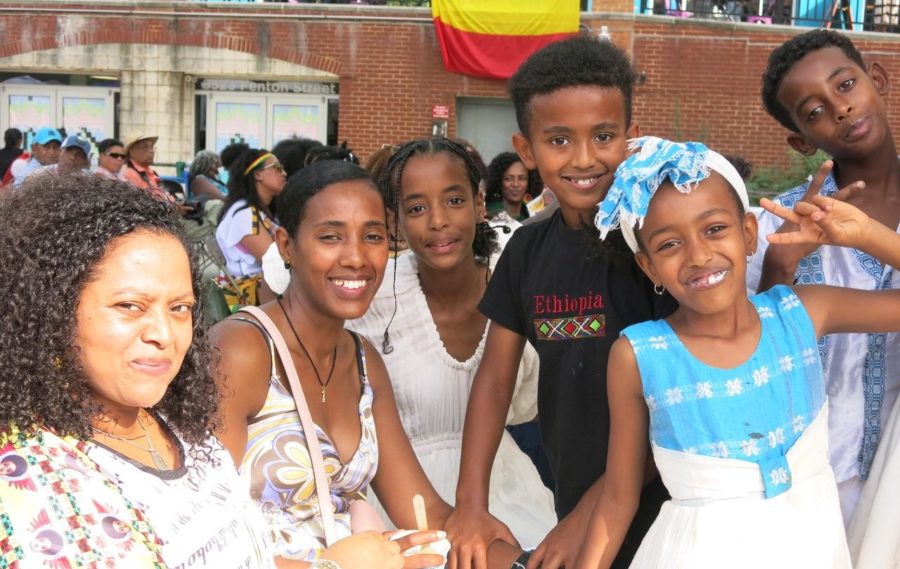
On most mornings you’ll find Abeba Tsegaye behind the counter at Kefa Café on Bonifant Street, serving a local clientele. After college in Ohio, and a year at a brokerage firm in Indiana, she joined the family business in Silver Spring, that opened in 1996. They created an oasis in a rundown area ripe for renovation.
“We made that place just like our home. We want people to feel like they [were] in their living room,” she said. “We are very serious about our coffee, and how we treat people.”
That coffee culture is strongly tied to daily life in Ethiopia, where friends and neighbors roast and drink coffee together, sharing stories and family concerns. “That’s how people communicate,” she said, and the spirit she carried with her when she fled Ethiopia with her younger brother in 1987, a time when her father was under house arrest for ties to a previous regime.
Years before, her aunt Marta Gabre-Tsadick, Ethiopian’s first woman senator, was forced to flee after the military takeover in 1974, and escaped to Fort Wayne, Ind. There she founded Project Mercy, a nonprofit to help Ethiopian refugees, which helped Tsegaye and her brother get to the United States after over a year as a refugee in Sudan. Tsegaye’s other two siblings, an older brother and sister, also fled, traveling by foot across the Danakil Desert into Djibouti.
Tsegaye’s life came full circle in Kefa Café with the aroma of fresh Ethiopian coffee. Like back home, conversation is ongoing and friendly, a place where customers become friends, and baby pictures cover one wall. Activists have launched political campaigns and nonprofits from these small rooms. They’ve stood by when it was the only shop on the block, and through a fire that destroyed the building, and the pandemic. Tsegaye watches closely as Purple Line construction has closed shops around her. “We haven’t given up yet,” she said. “This is our baby. We’re going to do our best to stay.”
More Ethiopians live in the Washington, D.C., region than any other urban area outside of Addis Ababa, the Ethiopian capital, according to the Migration Policy Institute, a non-partisan think tank. That number is close to 40,000, although leaders in the Ethiopian community interviewed for this story say that is a dramatic undercount.
A 2019 U.S. Census Survey put the Ethiopian population in Montgomery County at 18,000. That’s the largest concentration in the region. And, from its hub in downtown Silver Spring, it’s hard to miss. Radiating outward from the Silver Spring Civic Building at Veterans Plaza, the central business district is populated with Ethiopian-owned restaurants, bars, dance clubs, coffee shops, grocery stores and hair salons. Ethiopian lawyers, doctors, dentists, bankers and accountants work in the office buildings. Signs on store fronts in Amharic promote driving schools and tech services.
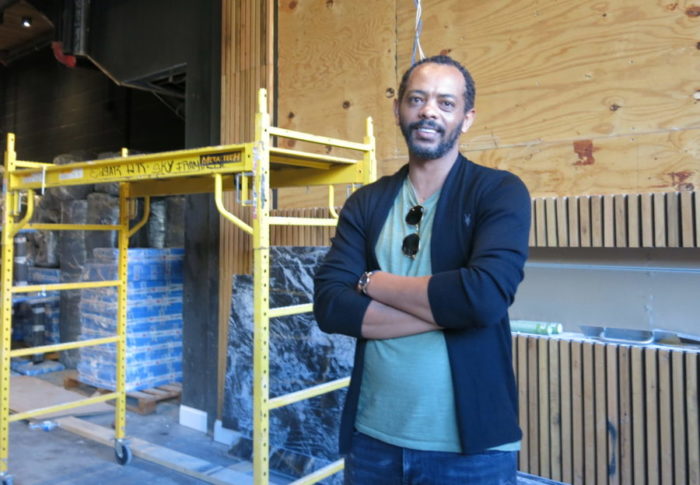
Winning ticket to America
Tsega Haile’s immigration story began with a stroke of luck. He won a Diversity Visa, and in 2008 headed to Silver Spring, where he had family. He began work with a friend in a telecom business, but it was coffee that was on his mind.
“I was literally sitting the whole day in Starbucks, watching people, and I decided one day I’m going to open my own coffee shop, with coffee from Ethiopia,” he said.
Haile opened Kaldi’s Social House on Silver Spring Avenue in 2014 with four employees. He built outward, taking over an auto shop, and upward, securing a bank loan to remodel a second floor and expand on to the roof. Business was good, so good that he was approached by a business agent to open a second location in Clarendon, Va., which despite setbacks during the pandemic, he did in 2020.
“From the moment we opened the door, I [saw] a lot of traffic,” he said, which led him to where he is on this day, a year into transforming yet another location, a pizzeria on Georgia Avenue into Citizens and Culture, a 15,000-square-foot sports club with wraparound bar, flat panel LED screens, and a second floor with lots of space for seating, and walk-out balcony overlooking the tree lined thoroughfare. “The idea is to open on time for the World Cup,” he said.
Haile’s business acumen doesn’t stop there. Now nearly 100 employees and a plan to open a specialty coffee shop at National Landing in Virginia, he works tirelessly to create venues that bring people together.
“It can be art, it can be music, it can be anything. Our doors are open to everyone, from all walks of life to use our space,” he said. “Here I work freely. I speak freely. Even if I smile or cry, I do it freely,” adding that for him America was and is always a possibility waiting to happen.
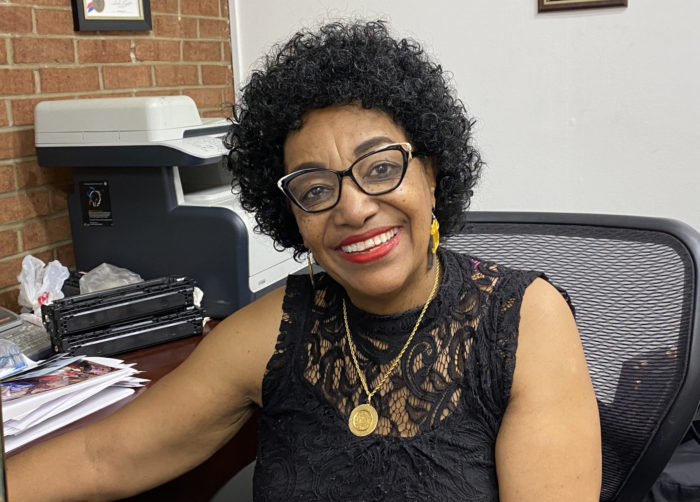
Anchoring Ethiopian culture in the diaspora
Alemtsehay Wedajo’s first job in America was at Vie de France, a bakery far from center stage at the Ethiopian National Theater in Addis Ababa where she had worked for 17 years.“All my life I [had] been acting, writing, producing and directing,” she said, reflecting on her career as an acclaimed actress and the country’s first female stage director. Also, during those years, she co-founded the Ethiopian Actors Association, established a theater for children, ran an arts program for war orphans, was a prolific poet, wrote plays and lyrics to many Ethiopian popular songs.
But, Wedajo was also an outspoken government critic. She opposed mounting ethnic violence and the country’s divisive politics.
“I wrote plays about that,” she said. “I wrote many poems about that,” explaining that those works were turned into propaganda and used against her. In 1991 she fled, seeking asylum in the United States with her two young children. She worked in the bakery, as a nursing aid and with Colonial Parking to support her children, along with her husband who eventually joined her.
Despite this detour, her passion for the arts never faltered. “Art is an addiction to me. I can’t live without it,” she said.
In 2000 she opened Tayitu Cultural and Educational Center in Washington, and later added an office in Silver Spring to promote Ethiopian artists in the diaspora, engaging locally in monthly poetry nights at Silver Spring Civic Building, later expanding nationally and internationally taking theatrical group on tour in the United States, Canada and Europe.
“We produced 60 plays in the last 20 years,” she said. supported by Tayitu, business owners and individuals in Silver Spring and elsewhere.
Along the way she garnered awards and letters of recognition from mayors, governors and community organizations, many of which are framed on the walls of her tiny office on Fenton Street.
Tayitu also is a conduit to tutoring English as a second language for new arrivals, and hosts acting workshops in the arts for young people at the Silver Spring Civic Center. “I want them to work hard to keep the dream going,” she said. “I want them to keep on going, to feel proud of themselves. Coming from Africa, they have a lot to give.”
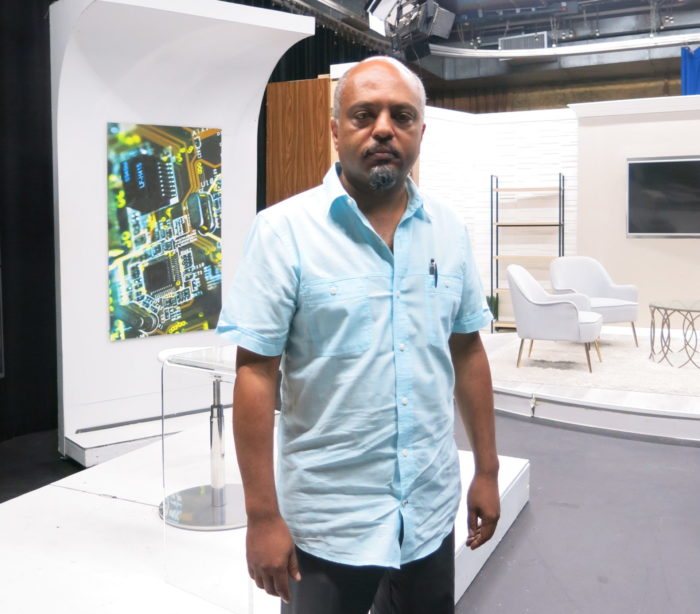
Broadcasting globally
Around the corner from Tayitu on Silver Spring Avenue is the Ethiopian Broadcasting Service. Programming from studios in this one-story ranch-style building, and from studios in Ethiopia reach 35 million Amharic-speaking people worldwide via satellite and another 1.7 million on YouTube channels.
EBS is the brainchild of Mussie Fissehazion and his two brothers, who began the operation in 2011. Fissehazion was an exchange student in Cedar Rapids, Iowa, attended college in Missouri and never returned to Ethiopia. In the mid-1990s, the brothers came to Silver Spring, where they had cousins.
“We started with a little cell phone shop called Clear Communications,” he said. “From there we got into the satellite business.” They worked as retailers for DISH Network, a major player in the direct-to-home market that had international satellite channels. “When we asked Dish Network to carry African programming, they had no interest.”
The brothers decided to create their own internet platform using IPTV.
“[We saw] a big gap in the Ethiopian [diaspora] community. Our goal was to fill that gap,” he said. They started with music videos, which evolved to the six hours of new content programming each day that includes drama, sports, talk, technology and magazine shows, supported by advertising.
As EBS chief technology officer, Fissehazion aggregates content and its distribution. He envisions EBS growth into a pan-African network, “We want to tell the African story, our story,” he said. “I’m [also] proud to be an American. But always, I have a soft heart for Ethiopia. I hope my kids realize where they come from without forgetting who they are.”
Rosanne Skirble is a freelance writer, who lives within walking distance to more than a dozen Ethiopian restaurants in Silver Spring.
Waves of immigration
Ethiopians have come to the United States in successive waves, says Getachew Metaferia, a political science professor at Morgan State University. Many, like him, were encouraged by Ethiopian emperor Haile Selassie to study abroad. Between 1941-1974, an estimated 20,000 arrived as students or to serve as officials with the diplomatic community and global institutions based in Washington and other U.S cities.
Metaferia began his journey in 1973. “The [idea] was to study, go home and help to build a well-developed democratic society,” he said. A military coup in 1974 overthrew the Ethiopian emperor and derailed those plans. It put Metaferia in the crosshairs of the government, and the continued political unrest and human rights abuses further delayed his departure.
It would be 30 years before Metaferia would return to Ethiopia. By then he was a university professor and American citizen.
“I had to keep a low profile there,” he said. “After my return to the United States, I was one of a dozen Ethiopians the Ethiopian government blacklisted.”
His crime: “In interviews [on VOA’s Amharic Service] after the Arab Spring, I had stated that the next domino to fall was Ethiopia because of the lack of jobs and ethnic-based animus,” he said.
What initially attracted Metaferia and so many others to the Washington area was the large population of African Americans, and education at historically black colleges and universities. Beyond that, the 1980 Refugee Act which among its provisions lifted the cap on Ethiopian immigrants allowed to enter the United States, and the Diversity Visa, a lottery for permanent residency that granted 50,000 visas a year from a global applicant pool of between 13 and 20 million.
“Ethiopians have contributed to the social, economic, cultural and political life in the United States,” Metaferia said. “We are becoming a power to be reckoned with.”
—Rosanne Skirble


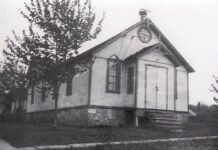


I feel sorry for Ethiopians, Eritreans, and Somalis. They come to Western countries and are forced to accept a Black or African identity just because the color of their skin. From my experience, they are different from the others and should be labeled as their own entity. They are calm, peaceful, and they stay to themselves. The problem is the kids grow up separated from their true culture and end up becoming criminals and drug-addicts. It is quite a peculiar dilemma and they have my sympathy.
Good luck!
Ethiopians need to focus on education and avoid race politics. It diminishes their true cultural identity.